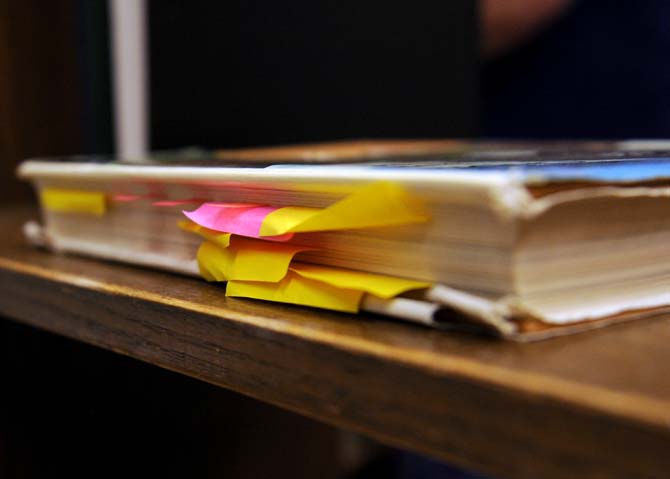One might not think leaving a sticky note or highlighting some words in a book could do any real damage, but it might just change the entire experience for the next reader.
Faculty Senate recently passed Resolution 13-03, which establishes that the defacing of library books is considered a violation of the Code of Student Conduct because it is considered property damage.
Interim Dean of LSU Libraries Elaine Smyth said the issue of students marking in library books has become a serious dilemma. Books have been turned in with writing throughout the pages, highlighting certain ideas in the text and even dozens of sticky notes.
While the problem may seem trivial to some, these small acts of disrespect can lead to University students losing books forever, Smyth said.
“People don’t always think of [library books] being property we all share in common,” Smyth said.
Head of Circulation Services Elissa Plank explained that when an adhesive material meets the page of a book, such as a certain type of paperback, it can stain the paper or even rip the page when it is removed. There have also been instances of people cutting pictures out of books, making content difficult to replace, Plank said.
The physical damage is difficult to repair, but marking in the book can also change the perception of the text, Plank said. If someone underlines a certain section of the book or writes their opinion, the next reader will not have the opportunity to form their own opinions surrounding the text, Plank said.
The Faculty Senate resolution also reveals that data was collected by student workers in a time log indicating “on any single day, 5.5 hours of student time could be taken up by [erasing marking in books].”
Certain books that have been severely damaged may be impossible to replace, Smyth said. Sometimes damaged books have gone out of print because they are so old and have become so expensive the library cannot afford to replace them, she said. This means that because of one reader’s actions, a future reader may not have the opportunity to use the resources the library provides.
LSU Libraries is launching a campaign to stop this problem and inform students of the damage that can be done by simple acts of disrespect, Plank said. The campaign will include bookmarks placed in every book checked out of
Middleton as well as information on the LSU Libraries website about basic book care.
“I think people don’t always think of [library books] being property we all share in common.”
Writing notes in books considered violation
September 25, 2013
A damaged library book with sticky notes in it rests on a shelf Wednesday, September 25, 2013, in Middleton Library. A new campaign is being launched to prevent students from damaging books.





